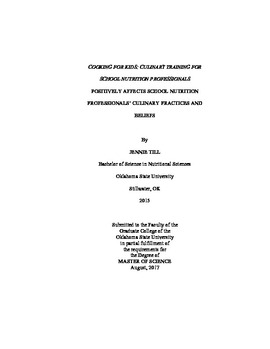| dc.contributor.advisor | Hildebrand, Deana | |
| dc.contributor.author | Till, Jennie | |
| dc.date.accessioned | 2018-06-08T19:57:52Z | |
| dc.date.available | 2018-06-08T19:57:52Z | |
| dc.date.issued | 2017-08-01 | |
| dc.identifier.uri | https://hdl.handle.net/11244/300013 | |
| dc.description.abstract | Changes made to the National School Lunch Program and School Breakfast Program in response to the Healthy, Hunger-Free Kids Act 2010, resulted in major challenges for school nutrition professionals (SNPs) to efficiently prepare healthier meals that students find palatable. Cooking for Kids is a chef-based culinary skill development training developed to address the specific needs of Oklahoma SNPs. Funding for the program is provided by the Oklahoma State Department of Education Child Nutrition Services through the USDA Food and Nutrition Services. The purpose of this project was to evaluate the effects of Cooking for Kids skill development workshops on beliefs related to school meals as well as food preparation and marketing practices of participating SNPs. Cooking for Kids Regional Training was offered during June and July, 2015, at six different sites in Oklahoma. Eligible participants were SNPs working in school districts that participate in federally funded Child Nutrition Programs (CNP). Participants completed a questionnaire regarding nutrition attitudes/beliefs and culinary practices on day 1 of training and 6 months post-training. There was an increase in reported use of mise en place (p < 0.0) and Smarter Lunchrooms practices (p < 0.0). SNPs reported a significant increase in beliefs that food they served tasted good (p = 0.049); teachers, administration, and staff thought the food tasted good and is healthy (p = 0.005, p = 0.04 respectively); and parents thought the food tasted good (p = 0.046). SNPs also reported an increased belief that food they served impacted health and academic performance of students (p = 0.001). There were inconclusive findings for reported frequency of scratch-made entrees as well as reported belief that cooks have the needed skills to prepare more made from scratch entrees. There was no significant difference in reported frequency of menu planning practices, frequency of taste-testing, or remaining attitudes and beliefs. In conclusion, a chef-based culinary training has potential to increase culinary skills of SNPs and create positive attitudes related to their role in student outcomes. Future training efforts should address menu planning and procurement with CNP decision makers to optimize scratch cooking methods, menu variety, and choices. | |
| dc.format | application/pdf | |
| dc.language | en_US | |
| dc.rights | Copyright is held by the author who has granted the Oklahoma State University Library the non-exclusive right to share this material in its institutional repository. Contact Digital Library Services at lib-dls@okstate.edu or 405-744-9161 for the permission policy on the use, reproduction or distribution of this material. | |
| dc.title | Cooking for Kids: Culinary Training for School Nutrition Professionals Positively Affects School Nutrition Professionals’ Culinary Practices and Beliefs | |
| dc.contributor.committeeMember | Gates, Gale | |
| dc.contributor.committeeMember | Brown, Barbara Jean Reed | |
| osu.filename | Till_okstate_0664M_15238.pdf | |
| osu.accesstype | Open Access | |
| dc.description.department | Nutritional Science | |
| dc.type.genre | Thesis | |
| dc.type.material | text | |
